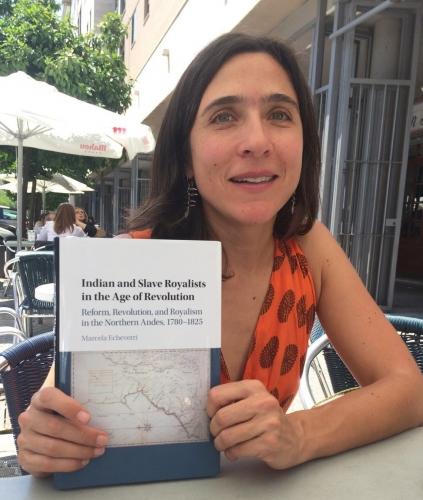New YGSNA Faculty Publication Investigates Indigenous Royalism in an Age of Latin American Revolutions

YGSNA faculty member Marcela Echeverri (History) has released an extensive new study that reconsiders the place of Indigenous peoples in the independence movements of Latin America. Indian and Slave Royalists in the Age of Revolution: Reform, Revolution, and Royalism in the Northern Andes, 1780-1825 (Cambridge, 2016) explores the ongoing appeal of “royalism” in colonial and independence-era Colombia, especially among Indigenous and slave communities. Such groups are not only often discussed separately by scholarly assessments of the period but also displayed long-standing ties to the Spanish monarchy that defy easy or simple explanation.
Excavating on-the-ground political and legal practices from 1780 to 1825 across the lowlands Pacific mining towns and in the Andean city of Pasto, Echeverri explains how and why people who were the objects of imperial rule became among its staunchest defenders. Indian and Slave Royalists shows why it is important to analyze the politics of Indigenous people and slaves in these settings by framing them in the wider contexts of the Andean and Atlantic worlds.
In the process, the book destabilizes national histories that diminish the diversity of political loyalties during the independence wars. Such nationalist histories also tend to project contemporary racial conceptualizations into the past. In particular, Colombian myths of national origins have portrayed royalism among the popular classes as reflections of racial discord and/or division. In this new interpretation, Indigenous people and slaves were allies of colonial elites and became essential subjects in those vertical alliances. At the core of their strategic defense of the monarchy were their interests in defending or transforming their rights in an imperial context.
Across much of the Hispanic Atlantic World, according to Echeverri, when Indigenous royalists expressed support for the Spanish monarchy they did so in an effort to maintain long-standing forms of economic, political, and cultural autonomy. They were not struggling to support an old, static, or conservative order, as has often been suggested, but promoting new political visions of freedom and citizenship rooted in the revolutionary ideologies and practices animating the Atlantic World during the nineteenth century.
Indian and Slave Royalists is Volume 102 in the Cambridge Latin American Series.
For additional information, see here